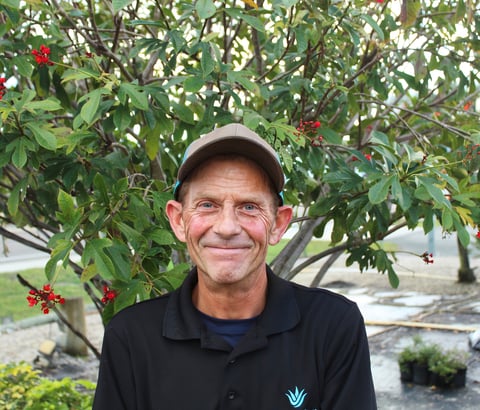
Top Ways to Diagnose and Fix Common Sprinkler and Irrigation System Problems
 Tom McCoy
Tom McCoy
There’s nothing quite like a well-functioning sprinkler and irrigation system to support healthy growth in your Florida landscape, whether for a lush residential lawn or a thriving commercial property.
When sprinkler issues arise, however, they can turn from a blessing into a costly frustration. Identifying and troubleshooting irrigation system problems can help prevent water waste and keep your landscaping vibrant.
The good news? It doesn’t have to be this way. Typically, sprinklers are hassles when they’re not working properly, and unless something major is going on, the problems they make us deal with are totally avoidable—if you know what to look for.
That’s exactly what we’re here to talk about. We’ve laid out a few of the most common day-to-day problems with sprinklers, how to diagnose when your sprinkler might be struggling, and what you can do to rig up some easy fixes that’ll ensure your sprinkler is running perfectly day in and day out.
Misty Spray – Common Causes and Quick Fixes for Irrigation Issues
Sure, a nice, misty, ethereal like fog or spray looks pretty for your yard—but it’s not actually helping your landscape thrive. If you’re dealing with a misty spray, what you’ve got on your hands is fluctuating water pressure, which can make your sprinkler sessions more of a foggy water show. If this happens, you’re not getting adequate irrigation to most areas of your lawn, so it needs to be remedied ASAP.
Our best suggestion? Check the valve and adjust the flow or switch your sprinkler head to a nozzle or rotor that allows you to adjust the pressure at the stem. Still having issues? Get in touch with a reliable landscaping professional to check out your sprinkler system.
Blocked Sprinkler Heads – What Causes Clogs in Your Irrigation System?
This is one of the biggest problems with sprinklers, and, if you think about it, it kind of makes sense. Your sprinkler heads are close to the ground, face-to-face with dirt and muck and grass all day—of course they’ll get blocked or clogged at some point. You can typically tell when you’re dealing with a clogged sprinkler head when water either isn’t coming out or when the water pressure has decreased substantially (trust us, you’ll notice).
Typically, this means there’s either a mass of dirt buildup on the heads that are blocking the water from coming out of the holes on the head. If this is the case, give your sprinkler head a good clean to dislodge some of the gunk and get your pressure back to normal.
Still clogged? Check out the screens and the nozzle of the sprinkler head for debris. Give those parts a good clean, too. If you end up still dealing with issues, it’s possible that you’ll need to replace the head altogether (if dirt, debris, and muck have made their way inside the sprinkler head).
Leaky Stems – Inspecting The Problem
For as helpful as sprinklers are, they can be pretty darn delicate—which is why it’s hugely important to be careful with the heads when you’re working in your yard. One misstep, one accidental run-in with the lawnmower, or one wrong turn of your vehicle and you can severely damage your sprinkler heads. When a stem, cap, or head is damaged—either from some kind of trauma or just from normal wear and tear—they tend to let water leak right out the side instead of properly spraying through the nozzles.
Further, leaks in your stems can be caused by sudden freezes, poor installation, and faulty valve boxes, too. Our best suggestion is to take a good look at the stem—if you don’t see any immediate damage, try to flush out debris that is stuck between the seal and the stem. If that doesn’t work—of if there’s obvious physical damage—to your stem, you’ll likely need to replace it.
Soggy Grass or Damp Concrete – Spotting Overwatering and Leak Issues
This one is pretty easy to spot, so we won’t say too much on this subject. Suffice it to say, if you look down at your driveway, pathway, walkway, etc. and notice pools of water on the concrete or you spy swampy, soggy sections of grass on your landscape, you’re likely dealing with some serious irrigation issues. You’ll want to get this fixed ASAP because, newsflash, you don’t need to water your concrete and you’re likely wasting a ton of money on water because of this issue (not to mention potentially drowning your grass).
Brown Grass Spots – Identifying Malfunctioning Sprinkler Patterns
The ultimate sign of a bad sprinkler pattern (which, is likely the result of malfunctioning sprinkler heads or the system entirely). If your typically-beautiful-and-lush landscape is looking a little brown around the gills, then you’re definitely in some kind of sprinkler trouble. We recommend turning your sprinkler on to see where the patterns are misaligned, where the water is accessing, and what spots your sprinkler system is missing—make adjustments from there.
Get Expert Help with Sprinkler and Irrigation System Problems
Don’t let your sprinkler issues ruin the beauty of your Florida landscape. Troubleshooting irrigation system problems regularly can save water, lower costs, and keep your yard looking its best. For expert assistance with your sprinkler system in the Tampa Bay area, call Landcrafters. With over 25 years of experience in Florida landscaping and irrigation systems, we’re ready to help with any issues you encounter.
Give our office a call today at (727) 493-7123 or reach out to us directly via the contact form on our website.


